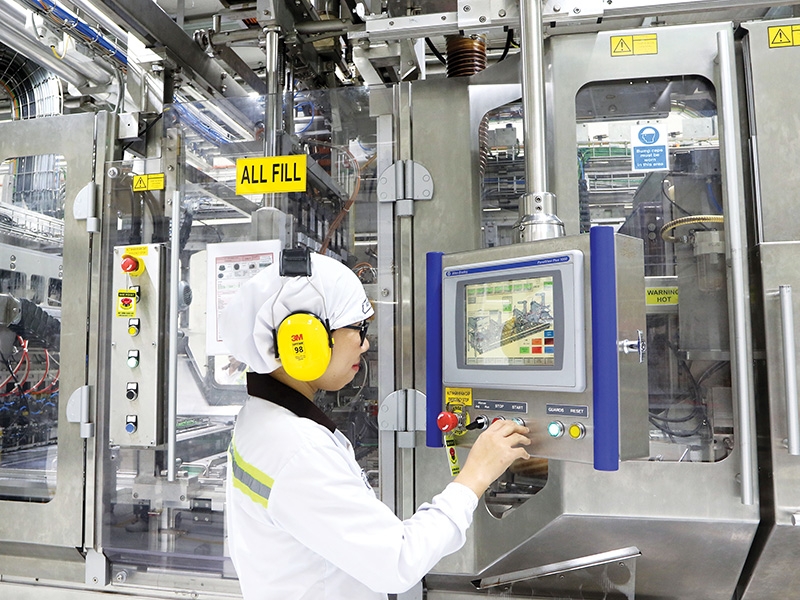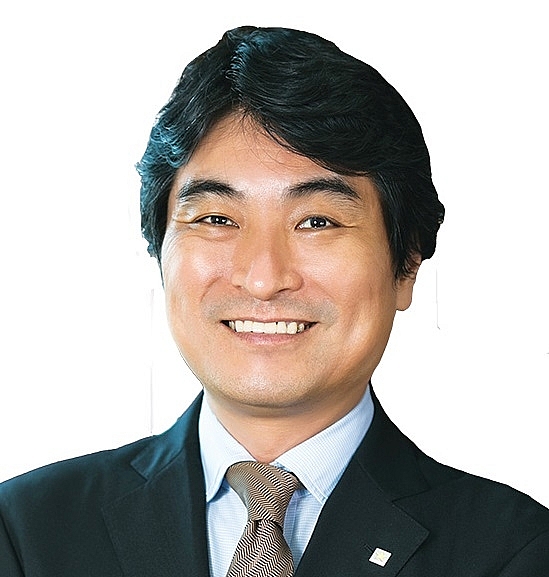Raft of new measures to aid business prospects
 |
| The Vietnam Business Forum will meet again imminently to discuss business conditions in Vietnam and more, Photo: Le Toan |
On January 10, the annual Vietnam Business Forum (VBF) will take place in Hanoi, providing a chance for enterprises to directly meet with the government to talk about their issues and plans. To be held following the government’s issuance of Resolution No.02/NQ-CP on tasks and measures to improve the investment environment and increase national competitiveness in 2020, the government’s strong determination to increase attraction ahead of the new decade is being consolidated.
Themed “Roles and Support of the Business Community in Rapid and Sustainable Development”, the most prestigious policy dialogue between the government and business community concentrates on how to regulate for sustainability, building sustainability and green growth together, along with soft and hard infrastructure innovation in tourism, investment and trade, tax and customs, agriculture, power and energy, capital markets, infrastructure, and also in human resources.
Increasing roles in new era
These talking points are not new at the VBF. However, this time they are aimed at further increasing the role of the business community to enable them to become a driving force of the economy and solutions for high quality sustainable and innovative investment, amid the wider influence of Industry 4.0.
According to the European Chamber of Commerce in Vietnam (Eurocham), groups such as the Singapore Business Association in Vietnam and German Industry and Commerce in Vietnam have members who are preparing for new investment in the country for the digital age.
The associations can contribute more to the Southeast Asian country’s sustainability by providing finance and technological expertise only when the barriers to collaboration are removed, Eurocham explained.
At the VBF event, tax and customs are expected to be discussed among business associations, especially the application of special consumption tax on sugary drinks, corporate income tax, tax refunds, and VAT as well as auto import procedures and overtime.
Japanese investors, in particular, are expecting clear regulations permitting land acquisitions and commercial transactions. “To attract investment in the high-tech sector, incentives are important, but they should be easier to apply,” said Takeo Nakajima, chief representative of the Japan External Trade Organization’s Hanoi Office.
Many Japanese firms have also complained that the sudden removal of the reduction of 50 per cent in personal income tax in special economic zones has negatively impacted businesses’ profit and capital strategies.
With sustainability now a prominent target, the Vietnamese government, as well as domestic and international businesses, took strong actions on sustainable development over the past year. As shown in the national Socio-economic Development Plan for the 2021-2030 period, the UN 2030 Agenda for Sustainable Development enjoys strong support.
In 2019, Vietnam saw strong movements among foreign-invested enterprises (FIEs) in some huge projects in manufacturing and green and clean energy sectors, using their technologies and know-how. For instance, German enterprises expanded their investments in Vietnam, not only in production but also in R&D centres, training, and technical centres in many provinces.
Vietnam made progress in other areas during the year, with the country’s ease of doing business score rising to 69.8 points versus the previous year’s score of 68.6, according to the World Bank Group’s latest Doing Business 2020 study.
The nation’s competitiveness also improved by 10 places, from 77th in 2018 to 67th according to the World Economic Forum (WEF). However, Vietnam only ranks mid-table within the ASEAN.
New moves afoot
In a bid to increase support from the business community in the country’s sustainable development, the Vietnamese government on January 1 issued Resolution 02, setting out seven key tasks and measures specifically to ministries, agencies, and local governments. The resolution focuses on improving the business climate ranking and business conditions, promoting the ASEAN and national one-door customs mechanism, promoting non-cash payment and fourth-level online public services, and developing innovative startups.
Under the new resolution, starting a business, granting a construction license, credit access, registration of assets, and settlement of contract disputes and business bankruptcy are the areas for further improvement.
In the first quarter of 2020 the Ministry of Finance plans a revision of Decree No.139/2016/ND-CP on fees and charges towards extending the time to declare and pay license fees to January 30 of the following year. The ministry will also promote the application of e-invoices in line with 2018’s Decree No.119/2018/ND-CP prescribing electronic invoices for sale of goods and provision of services.
The Ministry of Labour, Invalids, and Social Affairs will work with the Ministry of Planning and Investment (MPI) on developing an e-portal on labour information. This portal will be linked with a national information system on business registration, with plans to finish it in the fourth quarter of 2020.
Meanwhile, the MPI is to complete amendments to the Law on Enterprises and submit it to the National Assembly in May. The amendments will aim to remove or simplify unnecessary procedures to reduce market entry cost and time.
The Ministry of Construction also intends to streamline the license granting process. It will look to shorten the time taken to grant a license, reduce inspection numbers, and ensure that inspections will last for no more than 50 days.
To improve credit access among businesses, the Ministry of Justice will complete its amendment of the decree guiding the implementation of the Civil Code 2015 on secured transactions. The ministry will also work with the Ministry of Natural Resources and Environment and other relevant ministries and agencies to complete a legal framework on online land transactions, including a secure method of transferring land use rights and land-associated assets.
Half of the items subject to specialised inspection, which is a major concern among foreign-invested firms, will be removed. In the second quarter, reorganisation of the apparatus for specialised inspection under relevant ministries will be completed and streamlined.
These fresh bold moves are expected to allay the fears of foreign business interests and herald a new wave of high-quality overseas investment in Vietnam in the months to come.
| Mikio Masawaki - General director Sapporo Vietnam
Vietnam’s economy had a high growth rate in 2019, and this trend will continue. Vietnam has established bilateral and multilateral co-operation relations with many countries by signing free trade agreements. Despite the impact of the US-China trade dispute, foreign direct investment will continue to flow, providing strong motivation for Vietnam’s economy to continue to make a breakthrough. As a result, this will help improve social platforms and living standards. We believe that the overall development of the economy will provide us with many opportunities to expand. As the economy develops and standard of living improves, consumer goods and the beer sector in particular will become more premium in scope in order to meet the increasing demand. Dao Xuan Thinh - General director Thinh Dat JSC
Tourism has been one of our key business factors in recent years and 2020 is no exception. Besides the now-completed Le Champ Tu Le Resort, we will finish constructing one more luxury resort in Mu Cang Chai and a project in Tu Le commune in Yen Bai province. We are planning to organise other festivities in the province to promote the unique culture of 12 ethnic minorities. I hope local authorities will work with us to complete the paperwork quickly and efficiently. We would also like to connect with other investors to develop more products. I believe that if companies like us co-operate closely with local authorities, we can awaken the sleeping beauty of Yen Bai together. Nguyen Ba Luan - Vietnam country president Cargill Vietnam
On behalf of Cargill in Vietnam I would like to congratulate the country on its excellent progress in key macro-economic indicators. The year was an outstanding one with several key milestones reached to create strong momentum for Vietnam. The year will also mark the 25th anniversary of both the relationship normalisation between Vietnam and the US, and Cargill entering Vietnam. We are very excited about our future prospects here. Over the past few years we’ve witnessed exciting growth: the economy is expanding rapidly, industry continues to develop, there have been changes in customer requirements, and most importantly the government has made great efforts in economic reforms to help enterprises conduct business. As the market evolves opportunities rise, and we are making the necessary changes to make sure we have more customer insight and intimacy. By staying close to the regions we serve, we are able to deliver our best technologies, products, and know-how to help farmers achieve success as the industry becomes more mature and professional. Leon Cheneval - Director of business and product development Real Estate Data Network
The whole world appears polarised on sustainability and recent global disasters have really raised our personal and business opinions and thoughts to focus on what we can do. Many business commentators are saying that if we as a business are not sustainability focused then they will be loss leaders. That’s a real change of mindset when we compare it to previous business training. In 2020 we will continue our strategy to be more efficient a a result. As we are a tech company, we look at ways in which we can build platforms for multiple devices. While technology updates fast we are mindful to keep our clients’ hardware costs to a minimum or no cost upgrades at all. We have eliminated paper in our office procedures by over 70 per cent, all our communications are kept in a cloud. Cloud tech will get more secure by necessity and I see it as a key business need in 2020. Building better technology to leave a smaller environmental footprint is our continuing approach and business focus. Kim Van Tu - General director Resvico JSC
We have witnessed development across all sectors in Vietnam over the past year, especially in terms of the fluctuation in the real estate market in segments such as condotels. Real estate supply is scarce, and the credit for it is tight. Also, overlapping legal regulations have caused hundreds of projects to be delayed, making the market suffer. However, experts all agree that after the deceleration stage, the country’s real estate market still has positive potential. I hope the state will soon have full legal documents for practical segments of the real estate market. Foreign investment in real estate continues to grow. In Hanoi, condominiums in districts will thrive. In the Quang Ninh market, focus will be on urban development and resorts in Van Don. And in Danang, there is a strong development of high-end apartments and hotel apartments due to the mechanical population increase in the country, foreigners returning to Danang, and the growth of tourists. The trend of shifting investment to these provinces is increasing due to the development of transport infrastructure. Guru Mallikarjuna - General manager Bosch Vietnam
Bosch is one of Vietnam’s largest European investors with operations in R&D, manufacturing, sales, and services. Since Bosch Vietnam began operations more than 10 years ago, Vietnam has grown into one of our key growth markets in Southeast Asia. Leveraging the market potential, Bosch has been ramping up efforts in innovating tailor-made solutions to help local businesses increase efficiency and productivity. In addition, we continue to invest in training and talent development of our associates through domestic training and overseas assignments. We have also actively engaged in building up skills through our TGA vocational school training centre, and our recent public-private partnership strategic co-operation with the Directorate of Vocational Education and Training, the Deutsche Gesellschaft für Internationale Zusammenarbeit, and LILAMA 2 International Technology College to develop an Industry 4.0 curriculum for technical and vocational training. Our commitment to continuous investment and people development shows our confidence in this rapidly growing dynamic market. Trinh Thi Tuyet Anh - Director of business development Grant Thornton
The simple truth is that together we can achieve much more, particularly in regards to the Sustainable Development Goals of the United Nations. Attempting to reach these goals or exceed them is a major opportunity to align business strategies and communication over the next 12 months and beyond. As we step into a new decade, Grant Thornton perceives a great opportunity for businesses to adapt to this major trend by 2030 with the market value approximately worth $12 trillion per year. This could in turn create more than 380 million jobs in the process. One of the worth-considering targets suitable for the Vietnamese market would be continued promotion of beneficial and sustainable tourism. Carrying this out successfully would create jobs and promote local cultures and products. Our annual hotel survey has been recognised as a prestigious channel for the hospitality business in Vietnam to make informative decisions for implementing the UN’s Sustainable Development Goals in a more general fashion. Pham Dinh Doan – Chairman Phu Thai Holdings
In 2020 the government will make an effort to bring Vietnam into the group of countries with the highest competition capacity in the ASEAN. The business community plays an important role in helping Vietnam realise the target of sustainable development. They are considered pioneers in driving economic growth as well as building Vietnam’s position on the global economic map. Socio-economic growth depends on enterprises which have desire and determination to conquer challenges. In order to help the business community promote maximum power, the government still should complete the legal framework on corporate governance to be suitable with international practices, leading to promote enterprise growth and improve the business and investment environment. Besides that, the government should create the most favourable conditions for the establishment and registration of enterprises, including cutting costs and time in completing administration procedures. In general the state, government, and business community have to make an effort to catch up on integration on a global scale as well as the dizzying change of Industry 4.0. Michael Piro - COO, Indochina Capital
We just celebrated 20 years in Vietnam, and we have a very positive outlook for the real estate market for 2020 as well as for the economic growth of the nation. We are lucky to be working in a stable political landscape, which creates a conducive business environment and benefits local and international businesses operating in Vietnam. The Vietnam Business Forum has contributed to strengthening the private sector and promoting the economic and social development of many business communities. It has supported continued dialogue between the Vietnamese government and businesses, helping to create jobs, wealth, and improving living standards. To further develop business communities in Vietnam, we believe it is important for them to showcase how businesses create shared value in society. This can be done by promoting co-ordinated efforts between companies within and outside of business communities to operate in a manner that creates both long-term economic and social value, while ensuring they are helping Vietnam reach environmental and geopolitical security goals. Chung Le - Partner, Allens
To develop the business community in Vietnam toward sustainable development, there must be capable and responsible investors who see the benefit of doing business in a sustainable manner. In most instances, it will require more investment capital and longer time to recover such capital. An investment project aiming toward sustainable development may not be the most profitable or the one offering the lowest price in a bidding process unless sustainability is appropriately marked and rewarded. Therefore, the government’s preference and favourable treatment will be important in order to make a sustainable-development project viable. In terms of infrastructure projects, competent authorities should take into account various factors including experience and credibility of proposing investors, their use of the latest and best technology for the environment, and their track records. This will ensure optimal environment protection and social responsibility. Commitment toward the long-term development of a region or economic sector should also be factored into the criteria for the selection and approval of investors. Nguyen Van Cuong - Director, Navytex
Currently, the development of the textile industry is still unbalanced. The fastest growing sector is garments, but other fields such as spinning, weaving, dyeing, and design are still left behind. Around 80 per cent of the industry’s material is imported. Meanwhile, free trade agreements have very strict requirements on the origin of goods. Therefore, in order that Vietnam’s textile and garment enterprises develop sustainably, we need to build a stable and diversified supply of raw materials, gradually raising the position of domestic raw material suppliers. In addition, vocational training for the workforce should be focused along with investing in modern machinery and equipment so that Vietnamese enterprises can keep up with the world’s production trend. We expect the government will continue to expand co-operation with new markets such as the Middle East, Africa, and South America to widen trade opportunities. Associations need to improve the advisory role for the Ministry of Industry and Trade, and consult and connect Vietnamese businesses with importers in those countries because they need more trade prospects. |
What the stars mean:
★ Poor ★ ★ Promising ★★★ Good ★★★★ Very good ★★★★★ Exceptional
Related Contents
Latest News
More News
- Site clearance work launched for Dung Quat refinery upgrade (February 04, 2026 | 18:06)
- Masan High-Tech Materials reports profit: a view from Nui Phao mine (February 04, 2026 | 16:13)
- Hermes joins Long Thanh cargo terminal development (February 04, 2026 | 15:59)
- SCG enhances production and distribution in Vietnam (February 04, 2026 | 08:00)
- UNIVACCO strengthens Asia expansion with Vietnam facility (February 03, 2026 | 08:00)
- Cai Mep Ha Port project wins approval with $1.95bn investment (February 02, 2026 | 16:17)
- Repositioning Vietnam in Asia’s manufacturing race (February 02, 2026 | 16:00)
- Manufacturing growth remains solid in early 2026 (February 02, 2026 | 15:28)
- Navigating venture capital trends across the continent (February 02, 2026 | 14:00)
- Motivations to achieve high growth (February 02, 2026 | 11:00)












 Tag:
Tag:




















 Mobile Version
Mobile Version